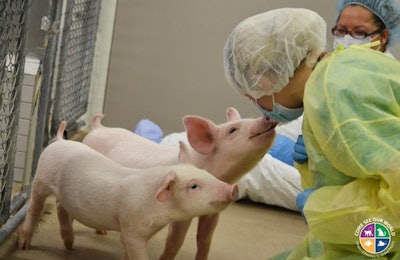
Consumers in the developed world are setting the agenda for animal agriculture and extreme animal activist groups are playing a large role in influencing their opinion. In order to tell our side of the story, and defend our industry, we must aim for the heart.
Activists targeting medical research
I recently saw Dr. Cindy Buckmaster, director of the Center for Comparative Medicine and associate professor of molecular physiology and biophysics at the Baylor College of Medicine, speak about her experience fighting back against animal rights organizations looking to end the use of laboratory animals in medical research.
She explained how a small group of extremists, organizations like People for the Ethical Treatment of Animals (PETA), use misinformation to encourage normal, well-meaning people to become activists for their causes. These groups are able to make rapid advances because they paint a picture of cuddly, domestic animals being tortured by mad scientists. She said this couldn’t be further from the truth. By law, research animals are well cared for and feel as little pain as possible.
The lies and smear campaigns of activists are already limiting research abilities. Successful, global campaigns to keep airlines from flying primates for medical research are forcing researchers to relocate to China. Ironically, the People’s Republic doesn’t require the same protections for animals. Now, she’s campaigning against measures to ban the use of dogs and cats in medical research across the U.S.
Going for the heart before the mind
Buckmaster said the research community is fighting back to preserve the use of animals for life-saving research. The group, Americans for Medical Progress, is active online via a website asking people to “come see our world.” This resource shares images of laboratory animals, stories of the affection researchers feel for their animals and facts about the medical progress made thanks to animal-based research.
The goal is to represent their side of the story and make it easier for curious people as well as influencers like journalists to see what is really going on in a research lab, in order to counteract the sensational falsehoods. She said the campaign is even using focused ads to target people who are visiting animal activist websites to show these people the truth about research animals.
Buckmaster said the key to communication on this complex issue of animal welfare is appealing to the heart before the mind. We can talk science and studies all day, but what really resonates with people is demonstrating how much love goes into raising and caring for the animals. The group even produced a video showing the affection people show for their lab animals to help drive the point home.
Copying the playbook
Programs like the National Chicken Council’s Chicken Check In platform as well as the communication and outreach efforts of individual producers are necessary and commendable. These campaigns should be continued. However, we must go further.
We must show everyone the compassion, care and respect farmers feel for these animals. We must get that message in a place where they can see it, whether it’s in their grocery store, on their television or in their Facebook feed.
Activists already have the advantage on the internet. Right now, if you Google “how chickens are raised,” the first result is literally an article called, “Factory-Farmed Chickens: Their Difficult Lives and Deaths.” The challenge is clear and we must work diligently to counteract this misinformation.
The stakes are high. Broiler producers are already losing antibiotics because of spreading consumer fears. Will the poultry industry lose the modern genetics that allow it to feed more people with less resources next? Telling our side of the story with attention to emotion may yet help the industry keep the tools it needs to feed the world.















